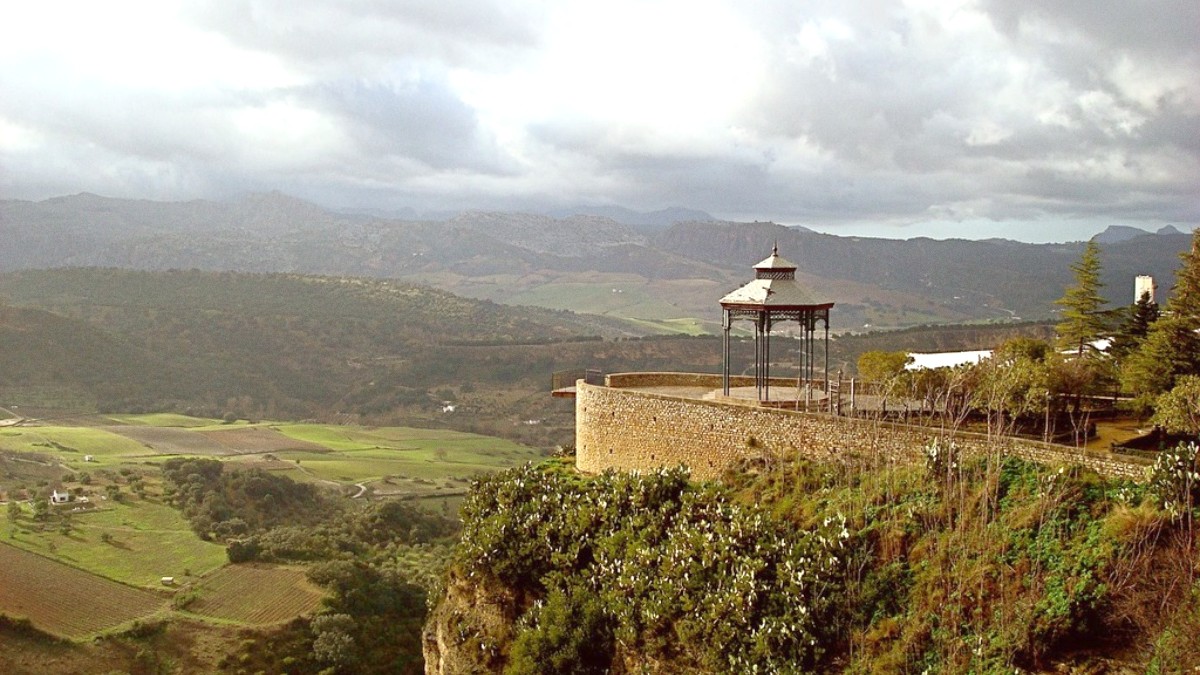
Andalucia, Spain
Ronda experiences hot and dry summers with temperatures up to 35°C (95°F) or above in July and August. Autumn brings mild and pleasant weather, 15°C to 25°C (59°F to 77°F), with increasing rainfall. Winters are mild, 10°C to 18°C (50°F to 64°F), with cooler nights and more consistent rain. Spring delivers mild and agreeable conditions, 15°C to 25°C (59°F to 77°F), with moderate rainfall.
Ronda's inland location and higher elevation create more pronounced temperature swings than coastal areas. Summers include intense heat and dryness. Winters, though mild, feel damp during rainy spells. Always check the specific forecast a few days before your journey.
High Season (June-August, Easter Holy Week, late Sept/early Oct): Warm weather supports evening activities. Expect larger crowds and peak prices. Book hotels and tours in advance.
Shoulder Season (April-May, September-October): Temperatures remain pleasant, ideal for sightseeing and hiking. Crowds are smaller, prices moderate. Higher chance of rain, especially in autumn.
Low Season (November-March, excluding Christmas/New Year): Experience Ronda with minimal crowds. Accommodation and flight prices are lowest. Cooler temperatures, higher chance of rain. Some smaller establishments may reduce hours.
Very high temperatures, larger crowds
Evening strolls, poolside relaxation.
Daytime sightseeing challenging, peak prices.
Comfortable weather, fewer crowds
General sightseeing, hiking, good value.
Higher chance of rain, some busy periods.
Minimal crowds, lowest prices
Quiet exploration, budget travel.
Cooler temperatures, higher chance of rain.
Spain is part of the Schengen Area, a group of 27 European countries with no passport or border control at their common borders.
Many nationalities (USA, Canada, UK, Australia, New Zealand) enter for tourism up to 90 days within 180 days without a visa. From mid-2025, ETIAS authorization (a pre-travel authorization) will be necessary for visa-exempt travelers. Visa-required nationalities must apply for a Schengen Visa (Type C, short-stay) at the Spanish embassy or consulate in their country of residence. Processing takes 15-45 days.
Valid 3+ months beyond departure, issued within 10 years, 2+ blank pages.
Proof of valid Schengen visa.
Financial means to cover stay (bank statements).
Hotel bookings or invitation letter.
Proof of departure from Schengen Area.
The cost of your journey varies greatly based on your travel style and preferences.
The official currency of Spain, and thus Ronda, is the Euro (€). ATMs are widely available. Credit and debit cards (Visa and Mastercard) receive broad acceptance. Carry some cash for smaller purchases or local markets. Inform your bank of travel plans to avoid card issues. A Travel money belt secures cash and documents.
Tipping in Spain is not mandatory but is appreciated for good service. For sit-down restaurants, round up the bill or leave 5-10%. In casual tapas bars, loose change for a few Euros is common. Round up taxi fares. Consider €1-€2 for hotel staff. For tour guides, €5-€10 per person for a half-day tour is generous.
Prices offer a general guide and fluctuate based on season, choices, and current economic conditions.
Spain maintains generally high standards of public health and safety. Ronda is a very safe town for tourists with a low crime rate.
Heat Exhaustion and Sunburn (Summer): Ronda experiences intense heat. Stay hydrated. Wear sunscreen (At least SPF 30), a Wide-brimmed hat, and Sunglasses. Limit outdoor activities during 12 pm-4 pm. Seek shade.
Food and Waterborne Illnesses: Tap water in Ronda is potable. Food standards are high. Practice good hand hygiene to prevent stomach upsets. Eat at reputable establishments.
Dial 112 for all emergencies (ambulance, fire, police). Pharmacies (green cross sign) and Medical Centers (Centro de Salud) are available. Nearest full-service hospital: Hospital de la Serranía de Ronda.
EU citizens: EHIC card grants access to public healthcare on same terms as Spanish nationals.
Non-EU citizens: Strong advice for comprehensive travel insurance covering medical emergencies and evacuation.
Tap water throughout Ronda is safe and potable. Drink directly from the tap without concern. Spain maintains high food safety standards. Most restaurants and eateries operate cleanly, dine with confidence.
Tap water is safe for drinking.
No specific food hygiene warnings; standards are high.
Ronda is very safe, with a low crime rate. Petty crime is less common than in larger Spanish cities, but remain vigilant in crowded areas. During dry, hot summer months, wildfires pose a risk in natural parks; heed warnings.
All central tourist areas are safe.
Wildfire risk in summer; avoid open flames in rural zones.
| Service | Number | Purpose |
|---|---|---|
| General Emergency | 112 | Police, Fire, Ambulance |
| Local Police (Policía Local) | 092 | Local law enforcement |
| National Police (Policía Nacional) | 091 | National law enforcement |